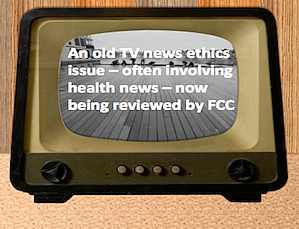Pay-For-Play TV Health News May Finally Be Regulated

"TV newscasts are increasingly seeded with corporate advertising masquerading as news - and the federal government wants to do something about it," reports the Washington Post.
It's an issue that may have arisen more often with health news than with any other topic. A quick (and probably incomplete) scan of my blog shows we've written about it every year for the past 5 years:
2007: http://www.healthnewsreview.org/2007/07/paidfor-tv-heal/
2007: http://www.healthnewsreview.org/2007/12/goodbye-columbu/
2008: http://www.healthnewsreview.org/2008/01/ethical-news-di/
2009: http://www.healthnewsreview.org/2009/10/another-example/
2008: http://www.healthnewsreview.org/2008/02/another-case-of/
2009: http://www.healthnewsreview.org/2009/04/the-black-hole/
2010: http://www.healthnewsreview.org/2010/04/another-breach-of-ethics-with-major-market-tv-health-news/
2011: http://www.healthnewsreview.org/2011/03/many-old-ethical-questions-arise-about-new-st-louis-tv-news-hospital-partnership/
Trudy Lieberman wrote about it in the Columbia Journalism Review in 2007: http://www.cjr.org/feature/the_epidemic.php
You can read the FCC proposal at: http://www.fcc.gov/encyclopedia/media-bureau-2011-headlines but you must scroll down to October 27, 2011 and look for the headline:
Modernizing Television Broadcast Public File Availability (the file labeled FNPRM in Word or Acrobat formats)
The document states that last summer an FCC working group released "The Information Needs of Communities" or INC report.
"The INC report recommended requiring that when broadcasters allow advertisers to dictate content, they disclose the "pay-for-play" arrangements online as well as on the air in order to create a permanent, searchable record of these arrangements and afford easy access by consumers, competitors and watchdog groups to this information.
The INC Report discussed examples of "pay-for-play" arrangements at local TV stations, where "advertisers have been allowed to dictate, shape or sculpt news or editorial content." The INC Report expressed concern that this practice could have negative implications for the community's trust in local TV. The INC Report recommended that the Commission require that the on-air disclosures for such "pay-for-play" arrangements, which are already required to be disclosed on-air, be available online, perhaps as part of the public file, in order to create a permanent, searchable record of which stations use these arrangements and to afford easy access by consumers and watchdog groups to this information."
I support the FCC proposal. If anything, I think it doesn't go far enough.
I know that health care journalists who work hard to convey health care news and information accurately, in balance, and completely are very upset about these broadcast practices. They jeopardize the credibility of all journalism.
Remember: these corporations that own the broadcast stations do not own the airwaves. The public airwaves belong to the public.
Sadly, this is a radio issue as well, and I've tracked some of these practices:
2005: http://www.healthnewsreview.org/2005/08/is-ap-radio-inv/
Of course, we've seen some newspaper examples as well: http://www.healthnewsreview.org/2008/03/newspaper-lets/
